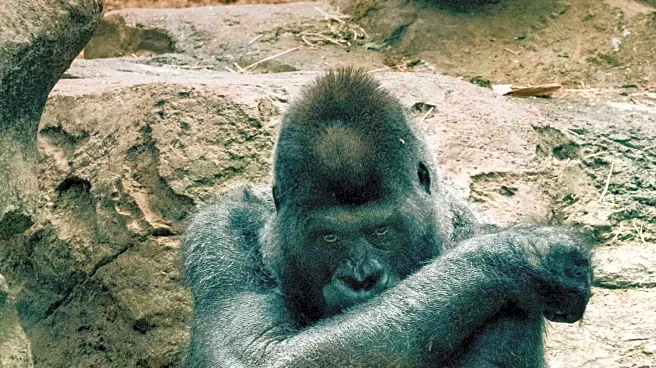What is the story about?
What's Happening?
Jane Goodall, the renowned naturalist and primatologist, has passed away at the age of 91. Goodall was celebrated for her groundbreaking research on chimpanzees, which challenged the scientific community's understanding of humankind. Her work began in 1960 when she discovered that chimpanzees, previously thought to be docile vegetarians, were capable of making and using tools, hunting prey, and exhibiting complex emotions similar to humans. Goodall's approach to naming her chimp subjects rather than numbering them was initially controversial but ultimately led to a deeper understanding of primate behavior. Her studies at Tanzania's Gombe Stream National Park became one of the longest-running studies of wild animal behavior. Goodall's work paved the way for other women in primatology and earned her numerous accolades, including the National Geographic Society's Hubbard Medal.
Why It's Important?
Jane Goodall's contributions to science and conservation have had a profound impact on the field of primatology and the broader understanding of animal behavior. Her discoveries challenged the notion of human uniqueness and opened new avenues for research into the social structures and emotional capacities of primates. Goodall's advocacy for chimpanzee conservation and sustainable development has influenced global policies and inspired generations to prioritize environmental preservation. Her establishment of the Jane Goodall Institute and programs like Roots and Shoots have mobilized efforts to protect great apes and educate the public on conservation issues. Goodall's legacy continues to shape scientific inquiry and conservation strategies worldwide.
What's Next?
Following Jane Goodall's passing, her work and legacy are expected to continue influencing scientific research and conservation efforts. The Jane Goodall Institute will likely maintain its focus on advocating for great apes and supporting sustainable development initiatives. Researchers and conservationists may build upon Goodall's findings to further explore primate behavior and develop strategies to protect endangered species. Educational programs inspired by Goodall's work will continue to engage young people in conservation efforts, fostering a new generation of environmental stewards.
Beyond the Headlines
Jane Goodall's approach to studying chimpanzees, which involved personalizing her subjects and interpreting their behaviors in human terms, marked a significant shift in scientific methodology. Her work challenged the taboo against anthropomorphism in primate research and opened the door to new interpretations of animal behavior. Goodall's observations of chimpanzee violence and social dynamics have contributed to ongoing debates about the nature of aggression and the evolutionary roots of human behavior. Her advocacy for animal rights and conservation has highlighted ethical considerations in scientific research and the importance of preserving biodiversity.
















